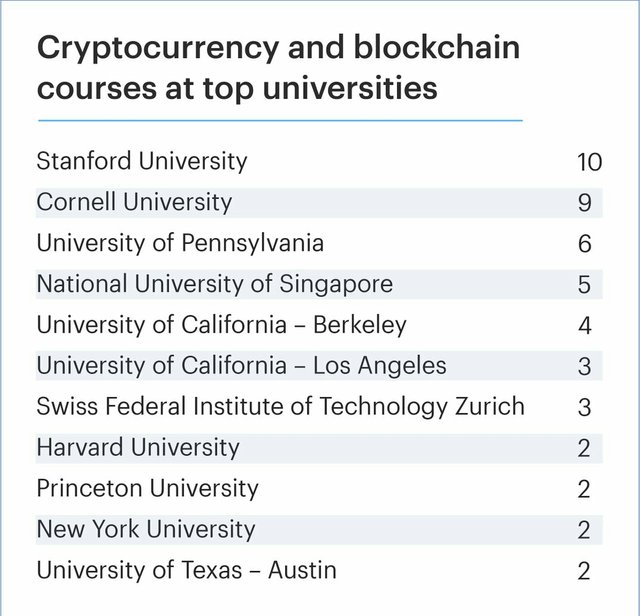CRYPTOCURRENCY Higher Education- provide by the TOP Universities
The upward push of crypto in higher education
Coinbase generally engages with students and universities throughout the us of a as section of recruiting efforts. We partnered with Qriously to ask college students without delay about their thoughts on crypto and blockchain — and in this report, we define findings on the growing roster of crypto and blockchain guides amid a regular upward push in pupil interest.
Key Findings
42 percentage of the world’s pinnacle 50 universities now offer at least one path on crypto or blockchain
Students from a vary of majors are interested in crypto and blockchain courses — and universities are including guides across a range of departments
Original Coinbase lookup includes a Qriously survey of 675 U.S. students, a complete assessment of publications at 50 global universities, and interviews with professors and students
When David Yermack, the finance branch chair at New York University Stern School of Business, first offered his direction on blockchain and economic services in 2014, 35 students signed up, eight fewer than the school’s traditional elective.
By spring 2018, the range of enrolled students climbed to 230, forcing Stern to move the type to its biggest auditorium. This academic year, Yermack will train the blockchain direction both semesters to meet hobby from students.
Yermack says he first developed the type due to the fact he was once fascinated in bitcoin and how shortly hobby in the cryptocurrency used to be growing. But other motives quickly emerged, especially demand from organizations for people who understood cryptocurrency-related issues. Now, he sees his class as a way to supply students the skills they’ll want for jobs in the future.
“A system is well underway that will lead to the migration of most financial statistics to blockchain-based organizations,” he says. “Students will gain noticeably by using reading this area.”
Similar scenes are playing out at pinnacle universities round the world. Students are flocking to lessons on cryptocurrency and blockchain — the “distributed ledger” technology that makes decentralized financial systems work — motivated in phase by using a hot job market for graduates with education in those fields.
Universities, in turn, are forming research facilities and including greater crypto-related courses, in part to meet rising demand and also due to the fact they now see cryptocurrency as an vicinity valuable of serious tutorial study.
Coinbase reviewed course catalogs at the pinnacle 50 universities and observed cryptocurrency classes throughout a range of departments, along with anthropology and finance — not solely pc science.
In fact, the upward jostle in choices across disciplines maps to student interest: Students with a numerous set of majors say they’d like to take cryptocurrency classes, according to a Coinbase survey conducted in partnership with Qriously. Nearly half of all social science majors expressed hobby in taking a crypto class.
One feasible cause for such diverse hobby in blockchain is its achievable to have an effect on society across many domains. “Blockchain combines principle and practice and can lead to integral breakthroughs in many research areas,” says Dawn Song, a computer science professor at University of California, Berkeley. “It can have definitely profound and broad-scale influences on society in many exceptional industries.”
To check the modern-day panorama of cryptocurrency in greater education, Coinbase analyzed the guides at the world’s top 50 universities as ranked by way of U.S. News and World Report. Our find out about focused on training handy to undergraduate-level students in the fall 2018 semester or the most recent semester for which information was accessible online.
- (pic. credit coinbase report)
The evaluation discovered that forty two percentage of the pinnacle 50 universities provide at least one class on blockchain or cryptocurrency, and 22 percent offer extra than one. Expanding the effects to include longstanding foundational instructions on cryptography, 70 percent of universities provide at least one crypto-related class.
Blockchain and cryptocurrency courses are most outstanding in the U.S. Only 5 of the 18 global universities on the list, or 27 percent, provide at least one type on blockchain or cryptocurrency. And only two — Swiss Federal Institute of Technology Zurich and National University of Singapore — offer greater than one.
Johns Hopkins University gives a business course on blockchain, the place college students examine about its security features and “the manageable benefits and weaknesses of its fundamental structure as utilized to corporations and organizations,” in accordance to the school’s course catalog.
At Princeton, college students can take an information-security class centered on impenetrable computing systems, cryptocurrencies, blockchain, and associated economics, ethics, and legal issues.
Cornell provides the best possible wide variety of lessons when inclusive of cryptography, cryptocurrency, or blockchain. The 28 publications encompass “Anthropology of Money” and “Introduction to Blockchains, Cryptocurrencies, and Smart Contracts,” which covers the cryptocurrency bitcoin and “the technological panorama it has stimulated and catalyzed,” in accordance to the route description.
More than 1/2 of the universities analyzed provide at least one classification on cryptography, the study of developing and solving coded messages and a key technical basis for blockchain and cryptocurrencies.
“The strategies used in blockchain aren’t always new,” says Song, as it attracts on areas such as cryptography, game theory, and allotted systems. These are areas “where lookup and even training has been around for a really long time.”
Stanford launched its Center for Blockchain Research this summer time to convey together students and school from across the school’s departments to work on a variety of components of cryptocurrencies and blockchain.
Dan Boneh, a professor of pc science and electrical engineering at Stanford University and co-director of the center, stated that each time he talks with a new group in the team he finds himself on foot away with three new lookup ideas. “There are new technical questions being raised through blockchain initiatives that we would no longer work on otherwise,” he says.
Other main universities that are recognized for robust engineering packages are including courses and programs founded round blockchain, too. The University of Waterloo, Georgetown University, and the University of Illinois at Urbana-Champaign are among these increasing their research and route offerings.
At Berkeley, Song co-taught a course in the spring semester of 2018 on “Blockchain, Cryptoeconomics, and the Future of Technology, Business and Law.” It was a collaboration between the school’s pc science, business, and law colleges and admitted an equal variety of college students from each school.
Song says the course was “hugely popular,” noting that the instructors had to flip away more than 200 students because their study room solely had a 70-student capacity.
That interdepartmental approach can also emerge as a hallmark of cryptocurrency and blockchain education, given the variety of departments that are currently supplying lessons on the subject. Coinbase’s analysis observed that of the 172 instructions listed by using the pinnacle 50 universities, 15 percent have been provided with the aid of business, economics, finance, and regulation departments, and 4 percent have been in social science departments such as anthropology, history, and political science.
Harvey says college students apprehend how in-demand this kind of know-how is now. “If you’re graduating from law college it’s a hard market these days,” Harvey says. “However, the law college students that are trained in blockchain, they don’t want to apply anywhere. People are just asking them to be a part of their firms.”
Among students, pastime in cryptocurrency and blockchain cuts throughout fields. In fact, extra social science majors — 47 percent — said they had been involved in gaining knowledge of about cryptocurrency than computer science and engineering majors — 34 percent — according to a survey of 675 U.S. students commissioned by means of Coinbase and performed through Qriously.
The survey found that 17 percentage of computer science and engineering majors have already taken a direction that focuses on cryptocurrency and blockchain, as have 15 percentage of economics and math majors and 11 percentage of business majors. Just five percent of social science majors have taken such a course, the survey found.
Among all college students surveyed, 17 percent said they think about their understanding of cryptocurrency and blockchain very good, compared to simply 9 percentage of the universal populace surveyed at the equal time. Similarly, 18 percent of students said they very own (or have owned) cryptocurrency, twice the fee of the common population.
A quarter of all students said they would clearly or likely take a path targeted on cryptocurrency or blockchain.
“There’s excellent excitement” among students right now, says Benedikt Bünz, a doctoral pupil at Stanford focusing on cryptocurrencies.
Bünz was pursuing a master’s degree in synthetic talent when he took a cryptography class. That sparked his interest in cryptocurrencies, setting the course for his doctoral degree.
People frequently strategy Bünz asking if he’d be in a position to advise anybody with know-how of cryptocurrencies for a job, he says, but the excessive demand means all the candidates he is aware of already have positions secured.
These days, he says, “if you’re an expert in cryptocurrencies and cryptography you’ll have a challenging time not finding a job.”
There are additionally plenty of options for people now not currently enrolled at a university to research extra about crypto. Online getting to know websites like Udemy, Coursera, edX, and Udacity provide lots of courses, inclusive of familiar instructions in foundational cryptography and greater specialised lessons on blockchain and cryptocurrency.
These lessons draw on a range of experts, including professors from some of the pinnacle 50 global universities and practitioners in the field. For instance, Coinbase Chief Technology Officer Balaji S. Srinivasan is one of numerous industry specialists featured as part of the Udacity nanondegree application referred to as “Become a Blockchain Developer.” The program has two three-month phrases and is focused on “mastering job-ready skills with a hands-on approach.”
Academia isn’t recognised for moving quickly. But professors say that the maturation of blockchain and cryptocurrency and their adoption with the aid of corporations and different companies over the last few years has made it clear that it’s a field with the attainable for wide-ranging impact. And that’s inflicting universities to take it seriously. “You want to put together your college students for the future,” Duke’s Harvey says, and “blockchain is now not going away.”
A observe on methodology
Coinbase analyzed the publications presently presented at the world’s pinnacle 50 universities as ranked by way of U.S. News and World Report: Best Global Universities 2018. Our learn about targeted on lessons handy to undergraduate-level college students in the fall 2018 semester or the most recent semester for which information used to be available online. The research excluded lessons that are graduate-level only. It left in training that are open to undergraduate and graduate students or instructions that have been no longer certainly marked as graduate-level only. Results for the search time period “crypto” have been excluded from the tallies and path descriptions checklist if they had been truly unrelated to cryptocurrency or the foundational math ideas underlying the technology.
To examine pupil sentiments about crypto, Coinbase additionally commissioned a study carried out via Qriously of 675 U.S. college students a while sixteen and older. The universal populace survey blanketed 6,011 respondents over the age of sixteen

